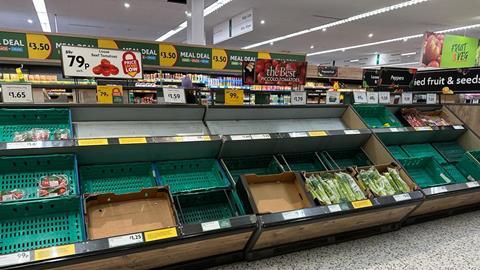Lee Stiles of the Lea Valley Growers Association explains why there is likely to be reduced availability in the fruit and vegetable aisle again in 2024
This is what will happen next year and why: supermarkets will have empty shelves again, government will say there isn’t a market failure, and more British growers will cease trading. This isn’t really a bold prediction as we said as much back in 2019.
All of this came true this year, yet nobody seems to be aware that this will continue. Once again, several factors will combine to reduce the availability of fresh produce next year.
Firstly, the government is set to review the horticulture supply chain, however at the same time they are also putting pressure on supermarkets to reduce food prices and bring down food inflation in pursuit of their target to halve overall inflation.
This means supermarkets are already asking growers for lower prices at a time when energy costs are increasing. In addition, hidden outlays such as standing charges and transportation costs are going up by 600 per cent, and labour costs are rising.
It is at this time of year that growers negotiate prices for next year and make decisions on whether to plant in December/January ready for February/March. If prices are not right, this could shorten the British growing season to around six months for some producers.
This year, during the empty shelves crisis, the government told supermarkets to source food from further afield. Overseas growers decided to send their produce to Europe instead of the UK for higher prices as British supermarkets refuse to flex from fixed contracts.
Next year, there will simply be less fresh produce from certain key sources, regardless of whether they experience adverse weather events. Plant viruses are rife, and thousands of acres of overseas tomatoes and peppers will be wasted.
It’s worth noting that the majority of fresh produce is waived into the UK without virus checks on the border. This will again increase food prices, and overseas growers will again send produce to the highest-paying market, which will not be the UK.
Isn’t it about time that British food security was taken seriously?




